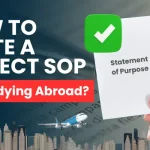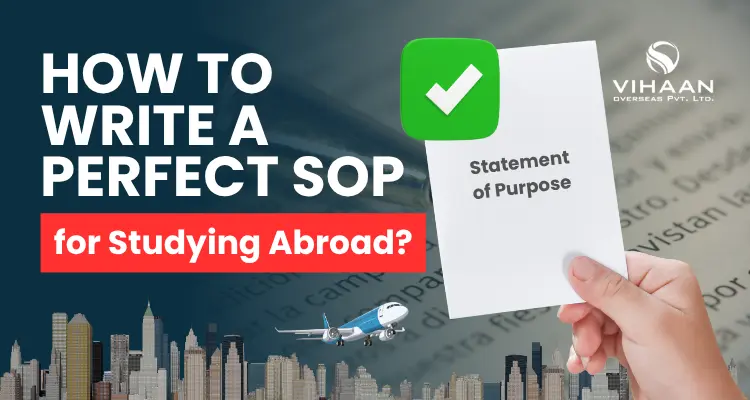
Duolingo English Test 2025: Eligibility, Fees, Preparation & More
June 3, 2025
How to Write a Perfect SOP (Statement of Purpose) for Studying Abroad?
June 19, 2025Many students dream of studying abroad, but a surprising number face rejection or delays due to avoidable application mistakes. The most common include poor research, weak personal statements, missed deadlines, inadequate financial planning, choosing the wrong course, overlooking visa requirements, and failing to prepare culturally.
Whether you're applying from India or anywhere else, understanding the top 7 mistakes students make while applying to study abroad—and how to avoid them—can significantly improve your chances of admission and visa approval. This guide will help you navigate the process with confidence and submit a winning, stress-free application.
Why Do Study Abroad Applications Get Rejected?
Studying abroad is one of the most exciting decisions you can make as a student. However, study abroad application mistakes can turn your dream into a nightmare. Every year, thousands of students face rejection not because they're not good enough, but because they made avoidable errors in their application process.
Is it hard to get accepted for studying abroad? The truth is, it doesn't have to be. With proper planning and guidance, you can significantly increase your chances of success. At Vihaan Overseas, we've helped over 14,200 students avoid these common pitfalls with a 97% success rate.
The most common mistakes students make in study abroad applications often stem from poor planning, inadequate research, and lack of professional guidance.
Why Do Students Make Mistakes While Applying Abroad?
Applying to study abroad involves several complex steps, documents, and deadlines. Mistakes usually happen due to:
- Lack of proper guidance or professional support
- Relying on hearsay or outdated online information
- Rushing through SOPs and paperwork
- Underestimating university requirements or visa protocols
Most of these are preventable with the right knowledge, timing, and expert help.
Mistake #1: Not Researching Universities and Courses Properly
What Goes Wrong?
Many students fall in love with a university's name or ranking without understanding what they actually offer. This lack of research about university programs leads to poor fits and eventual disappointment.Common research mistakes include:
- Choosing universities based solely on rankings
- Not understanding course curriculum and requirements
- Ignoring location and climate preferences
- Overlooking university culture and student life
- Not checking employment prospects after graduation
How to Avoid This Mistake
Step 1: Create a Research Framework Start by listing your priorities:
- What subject do you want to study?
- Which countries appeal to you and why?
- What's your budget range?
- Do you prefer big cities or smaller towns?
Step 2: Use Multiple Research Sources
- Official university websites
- Student forums and social media groups
- University ranking websites (QS, Times Higher Education)
- Alumni networks and testimonials
- Education consultants like Vihaan Overseas
Step 3: Look Beyond Rankings Consider factors like:
- Graduate employment rates
- Industry connections
- Research opportunities
- Support services for international students
- Scholarship availability
Mistake #2: Writing a Weak Statement of Purpose (SOP)
What Goes Wrong?
Your Statement of Purpose is your chance to tell your story, but statement of purpose mistakes are incredibly common. Many students write generic, boring SOPs that fail to stand out.
Common SOP errors:
- Using templates without personalization
- Focusing too much on achievements rather than motivations
- Poor grammar and spelling mistakes
- Exceeding word limits
- Not connecting past experiences to future goals
How to Write a Better SOP for Studying Abroad
The STAR Method for SOP Writing:
- S - Situation: Describe your background and what led you to this field
- T - Task: Explain what you want to achieve through this course
- A - Action: Detail your relevant experiences and skills
- R - Result: Connect everything to your future goals
SOP Structure That Works:
- Opening Hook (50-100 words): Start with a compelling story or motivation
- Academic Background (150-200 words): Your educational journey and interests
- Professional Experience (100-150 words): Relevant work, internships, or projects
- Why This Course (150-200 words): Specific reasons for choosing this program
- Why This University (100-150 words): What attracts you to this institution
- Future Goals (100-150 words): Career plans and how this degree helps
- Conclusion (50-100 words): Summarize your passion and commitment
Expert Advice: At Vihaan Overseas, our IDP-certified mentors help students craft compelling SOPs that have contributed to our 97% success rate. Contact us for personalised SOP guidance.
Mistake #3: Missing Important Application Deadlines
What Goes Wrong?
Missing deadlines for study abroad applications is one of the most heartbreaking mistakes. Unlike Indian universities, international institutions are strict about deadlines.
Why students miss deadlines:
- Poor time management
- Underestimating application complexity
- Not having documents ready
- Confusion about different deadline types
- Last-minute IELTS/PTE preparation
How to Stay on Track with Application Deadlines
Create a Master Timeline:
| Task | Months Before Intake |
|---|---|
| Research and shortlist universities | 12–18 months |
| Start IELTS/PTE preparation | 10–12 months |
| Take standardized tests | 8–10 months |
| Request letters of recommendation | 6–8 months |
| Draft and refine SOP | 4–6 months |
| Submit applications | 2–4 months |
| Apply for student visa | 1–3 months |
Application Deadlines Checklist:
- Early decision deadlines (usually November-December)
- Regular decision deadlines (usually January-March)
- Scholarship application deadlines
- Housing application deadlines
- Visa application deadlines
- Course confirmation deadlines
Mistake #4: Poor Financial Planning and Incomplete Documentation
What Goes Wrong?
Financial proof problems in student visa applications cause numerous rejections. Many students underestimate the total cost or fail to show adequate funds properly.
Common financial mistakes:
- Not calculating total expenses accurately
- Insufficient bank statements
- Last-minute large deposits (looks suspicious)
- Not understanding scholarship requirements
- Poor education loan documentation
Complete Financial Planning Guide
Calculate Your Total Budget:
| Expense Category | Annual Cost (Approximate) |
|---|---|
| Tuition fees | £15,000 – £40,000 |
| Accommodation | £8,000 – £15,000 |
| Food and groceries | £3,000 – £5,000 |
| Transportation | £1,000 – £2,000 |
| Personal expenses | £2,000 – £3,000 |
| Health insurance | £500 – £1,000 |
| Total | £29,500 – £66,000 |
Financial Documentation Requirements:
- Bank statements for the last 6-12 months
- Fixed deposit certificates
- Education loan sanction letters
- Scholarship award letters
- Income tax returns of sponsors
- Property valuations (if applicable)
Smart Financial Tips:
- Start saving early and maintain consistent bank balance
- Avoid large, unexplained deposits
- Consider education loans from recognized banks
- Research scholarships and apply early
- Keep all financial documents organized and updated
Mistake #5: Choosing the Wrong Country or Course for Your Profile
What Goes Wrong?
Choosing the wrong course or country is a mistake that affects your entire study abroad experience. Many students make decisions based on peer pressure or incomplete information.
How students make wrong choices:
- Following friends without considering personal interests
- Choosing popular courses without passion
- Not considering post-study work opportunities
- Ignoring climate and cultural preferences
- Focusing only on easy admission requirements
How to Choose the Right Course and Country
Course Selection Framework:
Step 1: Self-Assessment
- What are your genuine interests and strengths?
- Which subjects do you enjoy learning about?
- What career do you envision in 5-10 years?
- Are you more theoretical or practical in your approach?
Step 2: Market Research
- Job market demand in your chosen field
- Average salaries and career progression
- Skills gap in different countries
- Future industry trends and developments
Step 3: Country Comparison
Mistake #6: Neglecting Visa Requirements and Documentation
What Goes Wrong?
Visa rejection is every student's nightmare. How to avoid visa rejection India students often ask, and the answer lies in meticulous preparation and documentation.
Common visa mistakes:
- Incomplete or incorrect documentation
- Poor interview preparation
- Inconsistent information across documents
- Not understanding visa conditions
- Applying too early or too late
Complete Visa Application Guide
Essential Documents Checklist:
- Valid passport with at least 6 months validity
- University offer letter and CAS/I-20
- Financial documents and bank statements
- Academic transcripts and certificates
- English proficiency test scores
- Statement of Purpose for visa
- Medical examination reports
- Police clearance certificate
- Visa application form and photographs
Visa Interview Preparation:
Common Questions and How to Answer:
1. Q: Why do you want to study in [country]?
Good Answer: Focus on specific academic opportunities, university reputation, and how it aligns with your career goals.
2. Q: How will you fund your studies?
Good Answer: Provide clear breakdown of funding sources with supporting documents.
3. Q: What are your plans after completing your studies?
Good Answer: Show genuine intention to return home or follow legal pathways for staying.
4. Q: Why did you choose this particular course and university?
Good Answer: Demonstrate thorough research and genuine interest.
Mistake #7: Lack of Cultural Awareness and Language Preparation
What Goes Wrong?
Many students focus only on academic preparation and ignore cultural and language preparation tips. This leads to culture shock and academic struggles abroad.
Common preparation oversights:
- Not improving English communication skills
- Ignoring cultural differences
- Not researching local customs and laws
- Poor time management and study skills
- Not building independence gradually
Complete Pre-Departure Preparation Guide
Language Preparation Beyond IELTS:
- Practice conversational English with native speakers
- Watch English movies and TV shows without subtitles
- Read newspapers and academic journals regularly
- Join English speaking clubs or online communities
- Focus on pronunciation and accent training
Cultural Preparation Checklist:
- Research local customs and social norms
- Understand academic culture and expectations
- Learn about local laws and regulations
- Practice independence in daily tasks
- Develop cross-cultural communication skills
- Learn basic local phrases if applicable
- Understand tipping culture and social etiquette
Academic Preparation:
- Improve critical thinking and analytical skills
- Practice group discussions and presentations
- Learn to use academic referencing styles
- Develop time management and study techniques
- Practice essay writing and research skills
Practical Life Skills:
- Learn to cook basic meals
- Understand local transportation systems
- Practice budgeting and financial management
- Learn to use local banking and shopping systems
- Develop problem-solving independence
Now that you know the top mistakes students make while applying abroad, here's your step-by-step action plan to avoid them:
Final Thoughts: Your Study Abroad Success Story Starts Here
Studying abroad is an incredible opportunity that can transform your future. While the application process may seem complex, avoiding these seven common mistakes can significantly improve your chances of success.
Remember, every successful international student once stood where you are—full of hope, questions, and ambition. The difference between success and setbacks often comes down to early planning, informed decisions, and the right guidance at every step.
Key Takeaways:
- Start preparing 12–18 months before your intake
- Do thorough research before making any decision
- Invest time in strong, personalized application materials
- Plan your finances realistically and early
- Prepare culturally and linguistically for your destination
- Get expert guidance to avoid costly mistakes
Ready to Start Your Study Abroad Journey?
At Vihaan Overseas, we’ve helped over 14,200 students succeed—with 5,200+ visa approvals and a 97% success rate. From profile-based university selection to SOP writing, IELTS/PTE coaching, and visa assistance—we cover it all.
Contact Vihaan Overseas Today and take the first step towards your global education journey

















